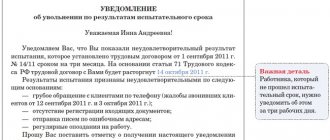What the law says
Article 3 of the Labor Code of the Russian Federation prohibits discrimination against employees based on age. From a legal point of view, a pensioner is exactly the same employee as everyone else. Current legislation does not provide for such grounds for termination of an employment contract at the initiative of the employer as the employee reaching retirement age. Therefore, the employer does not have the right to fire an employee just because he has retired. It is possible to terminate an employment relationship with a pensioner only in cases expressly established by law.
The procedure for properly dismissing a working pensioner
Termination of employment relations in all cases must occur in accordance with the requirements of the code and with respect for the rights of each party. If the procedure is not completed correctly, the employer runs the risk of being held liable if the employee goes to court or the labor inspectorate. Before making a decision, read the instructions on how to dismiss a pensioner legally.
Procedure for terminating an employment contract:
Step 1. Negotiate with the employee. Find out whether you can carry out the procedure at your own request to avoid red tape, or whether registration will be required on the initiative of your superiors;
Step 2. Prepare the necessary documents confirming the grounds for dismissing the pensioner. This could be an act of absenteeism, tardiness, or a conclusion from the certification commission about inadequacy for the position held.
Step 3. Notify the employee in advance about the upcoming procedure to avoid conflict situations and potential challenge of your decision in government agencies or court. If there are objections, negotiate peacefully.
Step 4. Issue an appropriate order to dismiss the employee, after which all due amounts must be paid: wages, compensation for unused vacations, severance pay in case of staff reduction.
A working pensioner has exactly the same rights and responsibilities as all other categories, so there are no exceptions to the procedure. It is enough to comply with all the requirements of the law and not violate anyone’s rights, then there will be no problems or labor disputes involving the labor inspectorate.
Leaving work at your own request
The easiest way to part with an employee is for him to leave on his own initiative. The pensioner can terminate the employment relationship at any time and retire on the day the application is signed. This does not require two weeks of work or other restrictions.
You may probably be interested in the following topic: resignation letter due to retirement.
To resign at your own request, an employee must prepare a written application in a simple free form and submit it to the organization’s human resources department. You can do this without prior warning, and then stop fulfilling your obligations under the contract.
What should the application contain?:
- Name of company.
- Full name and position of the employee.
- Reason for leaving work.
- The date on which all powers cease.
- Signature and date of submission.
It is not allowed to put pressure on a working pensioner to sign such a document. The expression of will in this method of terminating a relationship should come exclusively from the employee himself, without manipulation or blackmail.
Dismissal for medical reasons
It is quite natural that with age the state of health becomes worse, a person often gets sick, which causes dissatisfaction with both colleagues and management. But the employee’s health status alone, as well as regular sick leave, cannot become a reason for his dismissal. Therefore, the answer to the question whether a pensioner can be fired without his consent for health reasons will be affirmative in two cases:
- the employee, in accordance with the medical report issued in the manner prescribed by law, is completely incapable of working (clause 5, part 1, article 83 of the Labor Code of the Russian Federation);
- an employee who, in accordance with a medical report, has contraindications for the work performed, refused to be transferred to another job that is not contraindicated for him, or the employer does not have the corresponding work (Clause 8, Part 1, Article 77 of the Labor Code of the Russian Federation).
Payments and compensation due to a pensioner upon dismissal
When a working pensioner is dismissed, payments are made on a general basis, which include:
- Salary for days actually worked in the last month
- Compensation for days of unused vacation in the current working year
Compensation for vacation days is calculated on the basis of the average daily earnings of a pensioner, calculated for the last year using the average number of working days per month equal to 29.3. Moreover, each month worked in the current working year is equivalent to 2.33 days of vacation. The resulting number of vacation days should always be rounded up.
If the dismissal of a pensioner occurs due to staff reduction or liquidation of the organization, then the following is added to the listed payments:
- Severance pay for the first month after dismissal
- Compensation for inability to find employment in the 2nd and 3rd months after dismissal
For some categories of workers (workers of the Far North, workers of areas included in special lists, workers of closed administrative entities), the period of compensation in case of impossibility of employment can be extended to 6 months.
There are categories of employees for whom labor legislation provides for a reduction in severance pay to two weeks' pay:
- Seasonal workers
- Employees who refused to be transferred to another location for work
- Employees who refused to continue working after changing the terms of the employment contract
Calculation of severance pay is carried out on the basis of the pensioner's average daily earnings for the last year, and is calculated in accordance with the number of working days falling in the month for which severance pay is paid.
Reduction in headcount or staff
If you intend to dismiss a pensioner due to a reduction in the number of employees, then you must also follow the entire procedure established by law when terminating an employment contract on this basis. Please note that, in accordance with Art. 179 of the Labor Code of the Russian Federation, when reducing staff, the employer is obliged to give preference to employees with higher qualifications and labor productivity. Therefore, the reference in the comparative description to the retirement age will be unlawful, and the dismissal will be illegal.
Can a pensioner be fired without his consent?
The reasons for the dismissal of employees at the request of the organization are established in Article 81 of the Labor Code of the Russian Federation:
- reduction of position - dismissal of an employee of retirement age occurs according to the general rules and does not deprive the right to receive all due payments and two months' notice;
- identification and legal confirmation of the theft of the organization’s property - the pensioner bears responsibility in the general manner, including criminal liability.
If the employer discovers the theft and loss of funds or property by a person responsible for material assets, an investigation is carried out within the company or with the help of the police.
If the fact remains proven, then the employee is obliged to draw up a written explanation, and the employer has the right to dismiss him subject to payment of wages and other mandatory payments minus compensation for losses of the company. A corresponding entry is made in the work book regarding dismissal, indicating the reason for dismissal.
Watch the video. Is a pensioner subject to priority dismissal when staffing is reduced:
Expiration of the contract
A fixed-term employment contract is terminated upon expiration of its validity period, regardless of whether the employee has reached retirement age or not. The law allows the conclusion of a fixed-term employment contract with old-age pensioners entering work. But some employers, when an employee reaches retirement age, persistently offer him to switch to a fixed-term contract, arguing that this is supposedly a requirement of the law. Please note that such a translation is not provided for by law and is illegal.
The pensioner's work has become incomplete
If an employer is dissatisfied with the work of an employee of retirement age, he has the right to create an certification commission to evaluate skills. The certification commission evaluates the employee’s qualifications and, if a discrepancy is identified with the requirements of the position held, the employer has the right to offer the employee to change to a position of less responsibility or another that meets the qualifications.
If the employee refuses the offer, the employer has the right to dismiss him on this basis.
If an employer has doubts about the physical characteristics of a pensioner, he has the right to send the employee to a medical commission, which determines compliance with the requirements of the position.
If a discrepancy is established based on medical indicators, the employee is offered an appropriate alternative, and if he refuses, dismissal is lawful.
Attention! Our qualified lawyers will assist you free of charge and around the clock on any issues. Find out more here.
conclusions
Dismissal of a working pensioner is a matter that requires knowledge of certain information. A contract with such an employee can only be terminated on his initiative. The exception is the situations reflected in Article 81 of the Labor Code of the Russian Federation.
Reaching retirement age is not a reason to quit. If the employment relationship is terminated for this reason, the employee can appeal to the Labor Inspectorate, the prosecutor's office and the court.
After an appropriate inspection, the head of the company may be held accountable.
He may also be given an order, according to which he will be obliged to reinstate the dismissed pensioner in his position and pay him compensation.
Staff reduction
In difficult economic situations, many managers are forced to make a decision to sharply reduce the number of employees at the enterprise. In most cases, the first to be hit are workers of retirement age. At the same time, management is guided by the consideration that they receive a pension and are socially protected, unlike other employees.
Such actions of managers do not directly contradict Russian Legislation and the Labor Code. But they cannot be called completely legitimate.
In case of layoffs, all employees of an enterprise have absolutely identical rights, and the administration of the enterprise should not make a decision on dismissal only on the basis of a person reaching a certain age.
Dismissal due to staff reduction of a pensioner is no different from the process of laying off ordinary employees. Preliminary notice of dismissal must be given to the employee against signature two months in advance. The head of the enterprise can offer the pensioner an alternative option and select an appropriate position for him that is not subject to reduction.
By agreement with management, an employee can be laid off earlier than the two-month period has expired. At the same time, he is entitled to monetary compensation (in accordance with Part 3 of Article 180 of the Labor Code of the Russian Federation) for the entire remaining period that he still had to work at the enterprise.
In addition, the employee himself may leave earlier than scheduled if he manages to find a new place of duty. In this case, it will be enough for him to notify the management about this in writing and draw up all the documents.
After layoffs, pensioners are paid a benefit equal to two months' salary. There are no additional benefits upon dismissal.
In what cases does an employer have the right to dismiss a retired employee?
Is it possible to fire a pensioner at the initiative of the employer? Since pensioners are subject to the same rules of law as other employees, therefore, they can be dismissed under Art. 72–83 Labor Code of the Russian Federation:
- by mutual agreement;
- due to the expiration of the employment contract;
- at your own request;
- by transfer (at the request of the pensioner);
- changes in the terms of the contract, if the pensioner is unwilling to continue working under the changed conditions;
- if there is a medical certificate indicating the inability to continue working;
- in the absence of work suitable for the employee’s health condition;
- disagreement to continue working in another area;
- liquidation of the organization;
- upon the occurrence of events beyond the control of the parties;
- committing a culpable offense that precludes the possibility of continuing work.
The best option for terminating an employment relationship is the pensioner’s own desire and written statement.
At the initiative of the employer, dismissal due to staff reduction also occurs. But, as a general rule, he should offer all available vacancies. In addition, it is possible to terminate the contract in case of violation of discipline or in case of inadequacy for the position held.
The law states that the following circumstances are grounds for dismissal of an employee at the request of the employer:
- in case of termination of the operation of the enterprise or its liquidation;
- if the employee committed a gross violation of labor legislation or internal regulations;
- if the employee does not correspond to the position he occupies, which is confirmed by unsatisfactory certification results;
- in case of staff reduction. At the same time, pensioners have a better chance of avoiding dismissal, since when choosing candidates for layoffs, as a rule, the employer takes into account the experience and qualifications of employees, and not their age.
- Reaching a certain age is not a reason for dismissal;
- Pensioners have a number of advantages (in case of reduction and dismissal);
- In case of violation of rights, the injured party has the right to challenge the illegal decision or action in court.
If you believe that you were illegally fired from your job, then describe your situation to our duty lawyer online, and he will help you figure it out. You can also request a call back, and we will call you back promptly.
In connection with the entry into force of decisions that changed the retirement age, the government, wanting to mitigate the negative effect, introduced a new category of citizens: pre-retirees. The meaning of this concept is not legally established and is often interpreted differently. But for issues relating to the labor guarantees of such citizens, a definition exists, and it is given in the Criminal Code, in the new Article 144.
1 of the Criminal Code of the Russian Federation, introduced by law dated October 3, 2018 N 352-FZ. It says that for the unjustified dismissal of a pre-retirement employee, the perpetrator faces a fine of up to 200,000 or 3,600 hours of compulsory work. At the end of the article there is a note saying that a pre-retirement citizen is a citizen who has 5 years left until retirement age.
Conditions of dismissal
If it is still impossible to avoid dismissal, then the pensioner should know that:
- If dismissed at his own request or due to lack of physical capabilities and health, he can be dismissed without two weeks of service (Article 80, paragraph 3 of the Labor Code of the Russian Federation). However, you should know that if a notice of dismissal due to retirement has already been entered in the work book, then it will no longer be possible to leave without working and the employee must notify the manager about the termination of his work activity;
- In all other cases, the issue of working off is determined by the employer.
Inducing an employee to resign at his own request is a matter within the jurisdiction, so it is in the interests of both parties to resolve this issue strictly according to the law.
Reasons for dismissal of a retired employee
To be honest, not all managers prefer to keep older people on their staff, so the situations and reasons for their dismissal can be completely different. However, in the absence of the employee’s consent to this action of the employer, he can be dismissed only in connection with:
- Liquidation of an enterprise (Article 180 of the Labor Code of the Russian Federation);
- Reducing the number of personnel;
- Violation of labor order and obligations;
- Absenteeism;
- Confirmed lack of qualifications;
- Expiration of the employment contract (Article 79 of the Labor Code of the Russian Federation);
- Transfer to a new place of work;
- Changes in working conditions and actual location of the employer, as well as when changing the employer;
- Refusal to transfer for medical reasons;
- The onset of circumstances beyond the control of both parties (Article 83 of the Labor Code of the Russian Federation);
- Violations in filling out an employment contract.
When making a reduction, the head of an enterprise, as a rule, makes a choice in favor of qualified employees with excellent productivity and other professional qualities, so the age and health of the employee are not the main reasons.
Despite this, in some cases the employee’s health can become a fairly weighty argument.
Such situations include:
- Reasonable conclusion of the medical commission;
- The employee’s inability to cope with her responsibilities in accordance with the position held or offered in return;
- Lack of opportunity to continue working.
In the absence of any of the above reasons and in accordance with Art. 3 of the Labor Code of the Russian Federation, the dismissal of an employee of retirement age can be regarded as age discrimination.
In general, a reduction in the work of pensioners for no apparent reason is quite dangerous, since the consequences of such a procedure are quite severe. Faced with such injustice, an employee can file a claim with the courts, thereby creating big problems for his employer. At the end of the court case, the dismissed employee will be reinstated in employment and will receive good compensation from the organization, and the company’s reputation will be damaged.








